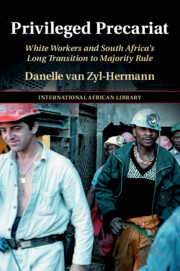Book contents
- Privileged Precariat
- The International African Library
- Privileged Precariat
- Copyright page
- Dedication
- Contents
- Table and figures
- Acknowledgements
- Abbreviations and acronyms
- Introduction
- Part I White workers and the racial state
- 1 Privileged race, precarious class
- 2 From sweetheart to Frankenstein
- 3 Race and rights at the rock face of change
- Part II White workers and civil society mobilisation
- Bibliography
- General titles
- Newspapers and online sources
- Index
- Series page
1 - Privileged race, precarious class
White labour from the mineral revolution to the Golden Age
from Part I - White workers and the racial state
Published online by Cambridge University Press: 17 April 2021
- Privileged Precariat
- The International African Library
- Privileged Precariat
- Copyright page
- Dedication
- Contents
- Table and figures
- Acknowledgements
- Abbreviations and acronyms
- Introduction
- Part I White workers and the racial state
- 1 Privileged race, precarious class
- 2 From sweetheart to Frankenstein
- 3 Race and rights at the rock face of change
- Part II White workers and civil society mobilisation
- Bibliography
- General titles
- Newspapers and online sources
- Index
- Series page
Summary
This chapter argues for a reinterpretation of the nature of white working-class privilege in twentieth-century South Africa. Presenting the structural and subjective formation of the white working class in the context of South Africa’s industrial and political development since the late nineteenth century, it shows that, rather than a labour aristocracy, white workers represented a privileged precariat – benefiting from the advantages bestowed by their white skin, but remaining precariously dependent on state benevolence to protect them from black labour competition. Challenging simplistic understandings of white embourgeoisement, it shows that, on the eve of the 1970s’ crisis of capital accumulation and liberation struggle, there remained a materially more vulnerable group of whites in South Africa. Their social position and political priorities were defined by their class position. The chapter introduces the whites-only Mineworkers’ Union, whose members exemplified this position of labour vulnerability concealed by race-based status. With this argument, the chapter lays the foundation for this book’s assertion that the shape and legacy of white working-class formation are crucial for understanding white workers’ responses to reform efforts from the 1970s and the subsequent dismantling of the racial state, presented in subsequent chapters.
Keywords
- Type
- Chapter
- Information
- Privileged PrecariatWhite Workers and South Africa's Long Transition to Majority Rule, pp. 33 - 75Publisher: Cambridge University PressPrint publication year: 2021



